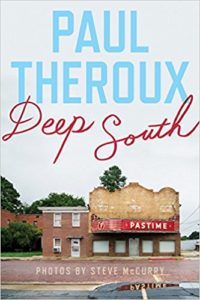Did not finish because there’s only so much smug old guy I can take
 Deep South
Deep South
by Paul Theroux
I don’t usually review books that I don’t finish, but I find I have a lot to say about this book. I know there will be people who disagree with me because Paul Theroux is much lauded for his travel writing, and at a sentence level I would have to agree that he’s a great writer. But there was something about this book that made me deeply uncomfortable, and it was not the non-revelation that there is serious poverty in the southern United States, or that racial tensions continue to exist there.
Theroux has a high sense of self-importance and takes great pleasure in displaying how well read and well travelled he is. He repeatedly makes sweeping generalisations that are designed to demonstrate his open-mindedness or liberal politics but actually serve to make the opposite point. He keeps presenting the reader with terribly nice southern black men who turn out to have street smarts but little education, and then white men who are hideously racist and gun-crazy. He’s over-simplifying complex issues, and not in a particularly interesting way.
“Some of these nonlinear ethnic niches, in the form of back-roads motels, were clean and well run, but many were dire to the point of disgusting. One of these…was among the filthiest places I have ever stayed in a life of resorting, out of desperation, to flophouses. Masses of dime-sized brown beetles on the walls of my Travelers Inn room were creeping to the ceiling, where they clustered and dropped in gobs, pinkle-pankling onto my face…the room was filthier by far than almost any I’ve found in Africa or China, or for that matter India.”
Theroux is repeatedly rude and presumptuous to people who have made time to speak to him. He laughs in the face of a woman whose son does charity work in Africa, asking why her son doesn’t see that the poverty here at home is just as bad. While he claims to have planned to just drive around without a specific route, he has clearly done research beforehand and aimed directly for the poorest areas. And his long, ultimately pointless aside on the N word smacks of the race-equivalent of mansplaining.
This is all especially irritating because when Theroux limits himself to describing physical geography, whether nature or roads and buildings, he’s really good. And some of the conversations he reports having are interesting and insightful. But his tone and attitude are consistently smug. In the end, this amounts to poverty porn, and it’s not even excused by any decent insight into how these areas came to be so poor or how they could be helped.
“It has been argued (by, among others, John Shelton Reed in The Enduring South) that the cities of the contemporary South have ‘nothing distinctly Southern about them’. You have to leave them to know the true tensions of the region. The last houses at the city limits in these island-like places seemed to define the contours of a shoreline, and after that it all dropped off. Beyond, the landscape was like an ocean, with a simple and unusually empty horizon, people living in flyspecks in radically different ways – always much poorer and often speaking a different language, or so it seemed to me, an outsider both in the clutter of the urban island and in the empty green sea of the hinterland.”
I gave up reading this about a third of the way through. I was tempted to stop pretty early on by Theroux’s summary of other travel books about the Southern USA, in which he dismisses all as having done it wrong, but not before making a point of mentioning one author’s sex change and another’s sexuality, which are both entirely irrelevant in this context. By page 162 I just could not cope with him telling me one more time about how he was reminded of the Indians who settled in Uganda and ran shops there, who he lived with for six years and therefore he of course knows absolutely everything about them and by extrapolation all Indians. The insert of photographs by Steve McCurry is good though.
Published 2015 by Penguin Random House.
Source: Waterstones Bristol.